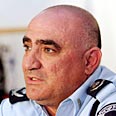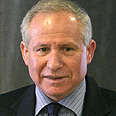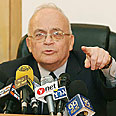


Police Commissioner Moshe Karadi announced his resignation Sunday evening, following the harsh report submitted by the Zeiler Commission earlier in the day and despite the fact that two out of three of the committee members ruled that he could continue in his post until the end of his term in August.
"As a person who understands the importance of the organization, I must take into account the witch-hunt which the organization could be thrown into. Out of a desire to take personal responsibility, I decided to announce that I am leaving my post as the Israel Police's commissioner.
"The Israeli government will decide on when I should leave my post. After 28 years in the service of the defense establishment I will bid farewell to the organization I love so much, which was a home and a family to me through most of my adult life," he said in a press conference.
Karadi admitted that he was surprised by the harsh conclusions related to him.
"I plan to address the issue in detail, but this is neither the time nor the place for that. This is a very difficult moment for me. This is a very difficult moment for the organization headed by me."
He accused stakeholders of using the committee as an axe, in order to slander and present the police as corrupt and unprofessional.
He made it clear, however, that the police would implement the committee's recommendations.
Judge Zeiler: Karadi must be dismissed
The police chief decided to convene his press conference before Internal Security Minister Avi Dichter's press conference, scheduled to take place at 7:30 p.m., in order not to create the impression that he was fired by Dichter.
The committee investigating the Perinian brothers affair submitted a report Sunday slamming the conduct of the police's top brass.
"The shortcomings which have been exposed point to obvious defects and norms in the police – or rather to the lack of norms," the commission wrote in its conclusions.
According to senior police officials, the police top brass was completely shocked by the report. Judge Vardi Zeiler, the head of the committee, said he believed the police chief should be dismissed immediately.
Police officials would prefer to see Karadi replaced by a police senior officer, warning of an "earthquake" if an outside commander was brought in.
Yedioth Ahronoth reported Sunday morning that Internal Security Minister Avi Dichter met with former Labor Party Chairman Amram Mitzna and offered him the job. Mitzna did not reject the offer, but asked to study it.
Dichter received the Zeiler report in the late morning hours Sunday, and immediately summoned the top police brass to his office. Dichter is expected to convene a press conference Sunday evening and respond to the affair.
The Perinian affair
The affair at the heart of the Zeiler Commission's investigation was only cleared for publication in August 2005.
The scandal centered on Tzachi Ben-Or, a police officer turned criminal, who became an accomplice of the Perinian crime family while still in uniform. In September 1999, on the orders of the Perinian family, Ben-Or murdered a rival crime lord, Pinhas Buhbut, during the latter's hospitalization at the Sheba Medical Center in Tel Hashomer. Ben-Or walked into the hospital in his police uniform and killed Buhbut with a shot to his head.
A year later, three months after he had left the police, Ben-Or was arrested during a robbery. He offered to turn state's witness and testify against the Perinian family in the case of Buhbut's murder in return for a reduced sentence. The district prosecutor turned the deal down.
The police, meanwhile, did not inform the judge who released Ben-Or to house arrest on the robbery charges, that Ben-Or was a murderer as well as a thief. A senior police officer, who knew that Ben-Or killed Buhbut, also decided to close the file on Buhbut's murder.
Ben-Or later fled the country, only to be murdered in Mexico in 2004.
The Zeiler Commission was established following the affair's exposure, and was entrusted with investigating the police and State Prosecution's conduct concerning the murder and during the probe which followed.
In May 2006, the commission sent warning letters to 13 senior officials, including Police Commissioner Moshe Karadi.















